
by Melanie Taylor | Sep 29, 2021
Until July 2, 2021, I felt confident I had done everything possible to stay safe and avoid contracting Covid-19. Throughout 2020 and well into 2021, I worked from home, socialized very little, quarantined when necessary, wore my mask, and constantly washed my hands. In fact, I may have dry skin on my hands for the rest of my life, but I still wash my hands frequently. The Covid-19 virus has become a controversial issue over the past two years, but my story is from real experience.
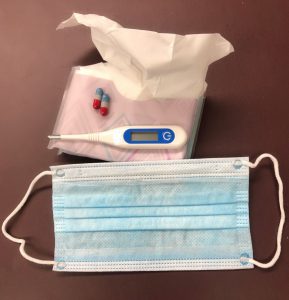
Keeping your fever under control is a necessity when battling Covid-19. Photo credit: Melanie Taylor
As I prepared to have a safe, but fun, Fourth of July weekend with a few vaccinated friends, I was winding down my Friday at work and started to feel achy. I headed home, excited for a 3-day weekend, but I still felt like I was dragging. My husband and I had plans to meet up with friends at a restaurant with outdoor seating, but before I left the house, I decided to take my temperature, just to be cautious. To our surprise, I had a fever of 99.9. We canceled our dinner plans and I took some acetaminophen, went to bed early, and we prayed it was not Covid-19. It was kind of an unspoken prayer because neither of us wanted to admit we were a little nervous about my symptoms. As the weekend carried on, I felt sicker as the hours and days went by and barely left the sofa or bed. On Sunday morning, I woke up with a bad dry, hard cough so my husband called my doctor. To be totally transparent, I am immunocompromised, so we both knew there was a chance I could have a breakthrough case even though I was vaccinated. Based on my symptoms, my doctor recommended I go to the emergency room and be evaluated since it was a 3-day weekend. I followed his directions, had a chest x-ray, which, thankfully, was clear, but I tested positive for Covid-19.
Let me honestly say, this was the sickest I had ever felt in my memories. For about twelve straight days, I laid on the sofa, took my temperature and oxygen levels, had no sense of taste or smell, ate food with no taste to keep up my strength, hydrated, and slept. The body aches, fever, dry cough, and fatigue were debilitating. I had every Covid-19 symptom listed by the CDC except for a headache. I thought to myself many times how bad and scary this could have been if I had not been vaccinated. My doctor clearly expressed his opinion that if I had been unvaccinated, I would have been hospitalized, no questions asked. Unlike many people, it was not recommended for me to take a regimen of pills or vitamins, so I fought it with acetaminophen, lots of hydration, healthy foods, and tons of rest. When I finally woke up on July 14th and could smell the coffee brewing, I knew the end was finally in sight. It still took two more weeks to feel and return to normal, and I knew firsthand this virus is no joke.
Like many of you, I know people that have tested positive and showed no symptoms, some that felt very sick but were able to stay home and recover, and some that never made it home from the hospital. I work in the field of science as a UF/IFAS Extension Agent and feel very strongly that we can all make simple efforts to reduce exposure to ourselves and others. The most important step is to pay attention to the symptoms and stay home if we suspect illness or exposure. Even though I was looking forward to the holiday festivities, I made a conscious decision to stay home on July 2nd just in case I really was positive with Covid-19. I wanted to keep my friends and family safe just in case there was a remote chance I was contagious. I feel very grateful I did not expose them to this virus.
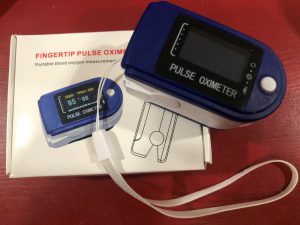
Checking your oxygen levels while sick with Covid-19 is a must. Photo credit: Melanie Taylor
The positive cases in Florida are lower right now, and that is fantastic. I am very excited about it too, but I also know we still shouldn’t put our guard down. Please stay aware. Be aware if you or a family member(s) have been exposed or do not feel well, and check for symptoms. I highly recommend every American household have a reliable thermometer, a pulse oximeter (safe oxygen levels should not go lower than 92), fluids for hydration, and foods of different textures because eating food without being able to taste and smell is very difficult. Different food temperatures, spice levels, and textures made eating to keep up my strength easier for me to handle.
The past two years have been stressful, emotional, and very exhausting. We still cannot forget to stay aware and diligent in our everyday lives to keep our families, friends, and communities healthy. Please revisit these CDC websites as needed and always consult your doctor when you have questions and concerns. Stay aware and healthy out there!
https://www.cdc.gov/coronavirus/2019-ncov/your-health/index.html\
https://www.cdc.gov/coronavirus/2019-ncov/symptoms-testing/symptoms.html
https://www.cdc.gov/coronavirus/2019-ncov/prevent-getting-sick/index.html
https://www.cdc.gov/coronavirus/2019-ncov/testing/index.html
https://www.cdc.gov/coronavirus/2019-ncov/if-you-are-sick/index.html
https://www.cdc.gov/coronavirus/2019-ncov/need-extra-precautions/people-with-medical-conditions.html

by Julie McMillian | Aug 27, 2021
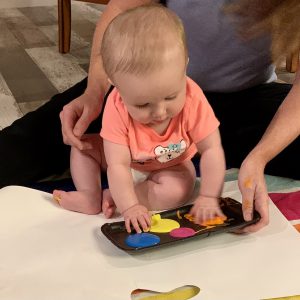
Fingerpainting Baby Sensory Photo Source: Julie McMillian
In the early childhood years there are key experiences that are essential to development. Babies and toddlers benefit from sensory activities and it is important for overall health and well-being. When does sensory development start? The answer is before we are born. Everything we do as humans involves our senses. In a child’s first five years, sensory play supports cognitive development, language, problem solving, and social and emotional interaction as well as motor development. Research shows that sensory play is needed for children to develop more complex learning abilities as they grow.
During the first twelve months, an infant begins to build an understanding of their world. It can seem like a challenging time because they are often exploring with their mouth. There are some simple activities that are both safe and entertaining for babies at this age.
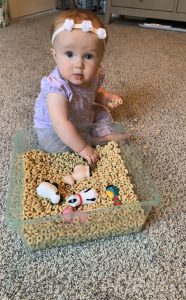
Baby Sensory Bin Photo Source: Julie McMillian
Sensory bins are hands-on interactive tools that use sight, touch, taste, hearing and smell. A sensory bin can also be used to hide and find objects which creates an opportunity to encourage language development. Fine motor skills can be developed by using the pinching, grasping, scooping, pouring, and stirring movements with a variety of tools. Sensory bins can be inexpensive and switched out easily to create strength and hand development.
Sensory Bin Ideas
- Sponges and Water
- Cooked pasta with food coloring
- Dry Cereal with or without toys
- Oobleck (2 cups cornstarch and 1 cup water)
- Gelatin
Outdoor sensory play is another great way to use multi-sensory experiences for healthy child development. Outdoor equipment at home or the park can be used. Simple experiences with grass, sand and water encourage exploration and creativity. A reserved child may come out of their shell when outdoors. Nature opportunities will provide health benefits of fresh air, exercise, and vitamin D.
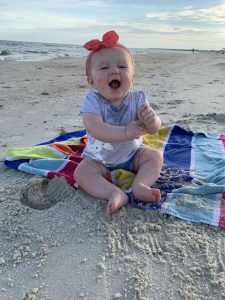
Baby Sensory Outdoors Photo Source: Julie McMillian
Outdoor Sensory Ideas
- Sit in the grass
- Crawl in the sand
- Smell the flowers
- Touch the leaves
- Take a nature walk
- Have a picnic
- Read a book
As a care giver, you can focus on a certain skill that may be lacking in a child’s development or provide an array of activities that stimulate growth. When children can explore and try new experiences they can attach meaning and unlock key skills needed for their future. Sensory play is valuable and essential for learning and the activities are endless.

by Julie McMillian | Aug 24, 2021
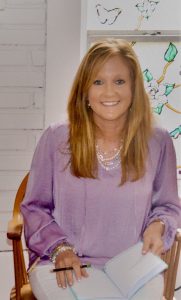 Julie McMillan is the Extension Agent for 4-H Youth Development and Family and Consumer Science in Gulf County. She started in March 2020 around the same time the pandemic went into full effect for many of us. It didn’t matter, though, because she couldn’t be more excited to serve the community and start her new career. Julie grew up in Gulf County in Port St. Joe. Early on, it was obvious that serving others would be a huge part of her life because it was modeled by her family. Julie joined 4-H at the age of eight and knows it contributed significantly to who she is today. She was able to learn responsibility, leadership skills, and how to make good choices while connecting with youth who would become lifelong friends. None of this enriching experience would have been possible without the Extension Agent and volunteers who gave many selfless hours to planning and preparing hands-on experiences.
Julie McMillan is the Extension Agent for 4-H Youth Development and Family and Consumer Science in Gulf County. She started in March 2020 around the same time the pandemic went into full effect for many of us. It didn’t matter, though, because she couldn’t be more excited to serve the community and start her new career. Julie grew up in Gulf County in Port St. Joe. Early on, it was obvious that serving others would be a huge part of her life because it was modeled by her family. Julie joined 4-H at the age of eight and knows it contributed significantly to who she is today. She was able to learn responsibility, leadership skills, and how to make good choices while connecting with youth who would become lifelong friends. None of this enriching experience would have been possible without the Extension Agent and volunteers who gave many selfless hours to planning and preparing hands-on experiences.
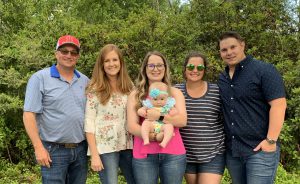
Julie’s Mom and Grandmother made sure she knew the ropes when it comes to taking care of family and anyone in need. They taught her how to make meals on a budget, grow and prepare fresh vegetables and fruit from a garden, and always give to those in need. Julie is married with two young adult daughters and a little one who was born last year. She likes spending any free time with family, friends, and their animals at their farm.
 Her background has primarily been in Education but she also worked in the health field for several years at the county health department. Julie started out teaching at a small private school and then spent many years at an Early Learning Center. Upon obtaining her Bachelor of Science Degree in 2012, she was given the opportunity to join the county school system as an elementary educator. Julie is known mostly for her love of and passion for horses. She and her husband run a small horseback riding on the beach business and have given riding lessons to people of all ages. However, this fall brings her back to school as a student. She has been accepted into the Graduate Program at the University of Florida to pursue a master’s degree in Extension Education. She is looking forward to continuing her education and expanding programs and experiences for youth and adults in her county and District.
Her background has primarily been in Education but she also worked in the health field for several years at the county health department. Julie started out teaching at a small private school and then spent many years at an Early Learning Center. Upon obtaining her Bachelor of Science Degree in 2012, she was given the opportunity to join the county school system as an elementary educator. Julie is known mostly for her love of and passion for horses. She and her husband run a small horseback riding on the beach business and have given riding lessons to people of all ages. However, this fall brings her back to school as a student. She has been accepted into the Graduate Program at the University of Florida to pursue a master’s degree in Extension Education. She is looking forward to continuing her education and expanding programs and experiences for youth and adults in her county and District.

by Melanie Taylor | Jul 9, 2021
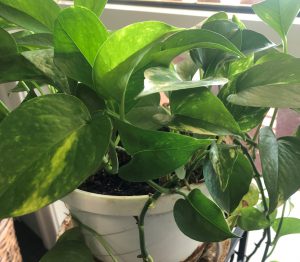
Some house plants are very easy to keep alive, even if you are a first-time gardener. Photo source: Melanie Taylor
As July begins, one mental health topic we repeatedly hear or read about is how stress is negatively affecting so many Americans right now. In these unprecedented times, many people are reaching out for guidance from their doctors, therapists, friends, and family. Depending on how your stress levels are affecting you, there are numerous suggestions ranging from exercise to therapy to medication and the list goes on. There may be one solution right at your fingertips that can help you begin to find a little peace of mind starting today. Gardening…. Let’s DIG IN!
Gardening does not have to be growing a large vegetable garden in the backyard. It can be planting flowers and plants in your landscape, maintaining potted plants on your front porch and deck, or growing houseplants inside your home. One easy way to start if you have never been a gardener is by growing herbs inside or out. Many people find gardening helps them escape to a place of peace as they dig in the soil and watch their plants and flowers grow and prosper.
This idea is not new. Horticulture is the art and science of growing plants. Horticultural therapy is the practice of engaging people in plant or gardening activities to improve their bodies, minds, and spirits. Research confirms that healthful benefits accrue when people connect with nature and plants by viewing and/or interacting with them.
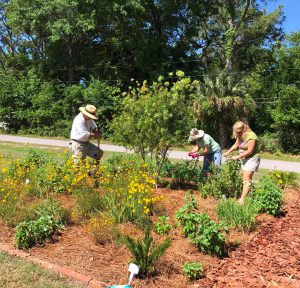
Enjoy socializing with friends and neighbors in the garden. Photo source: Julie McConnell
Horticultural therapy has been around for a very long time. In the 1600’s, the poor often worked in gardens to pay for their medical care. Physicians quickly noticed these patients recovered faster and had better overall health than patients who did not work in the garden. Today, many hospitals, long-term care facilities, rehabilitation centers, prisons, schools, social-service facilities, and community centers use people-plant interactions as a form of treatment for persons with physical or mental disabilities. Horticultural therapy may include meeting with a therapist specializing in this area or trying something on your own or with family, friends, or a local gardening group.
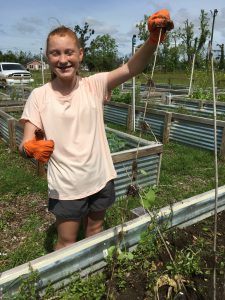
Saturday mornings are family time at the local community garden plot. Photo source: Julie McConnell
Some benefits you may receive from gardening include:
- Physical: Provides exercise at various levels. (Easy, medium, and strenuous levels – it all depends on what you decide to create.)
- Emotional: Promotes and satisfies your creative side, increases your feelings of confidence and self-esteem, promotes a new interest and enthusiasm for it, and even relieves tension.
- Physiological: May help lower blood pressure and heart rate, decrease cortisol levels, and ultimately relieve stress.
Even if you think you do not have a “green thumb,” you should try gardening on any level and see if it will be a healthy mode of stress release for you. Happy Gardening!
Source:
UF/IFAS Extension EDIS Document ENH970: Horticultural Therapy, Elizabeth Diehl and Sydney Park Brown.

by Samantha Kennedy | May 13, 2021
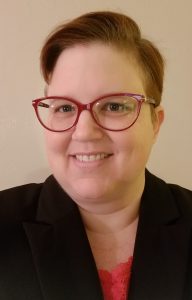
Samantha Kennedy, FCS Agent
(Source: Samantha Kennedy)
Samantha Kennedy is the Family and Consumer Sciences Agent in Wakulla County, FL. She specializes in health and wellness programming – healthy cooking, nutrition, and food safety – and is working to expand her expertise in financial education by studying to become an Accredited Financial Counselor (AFC).
Samantha – Sam, to her friends and family – received two degrees from the University of Florida (Go Gators!): a B.S. in both Microbiology and Cell Science and Nutritional Sciences in 2000 and an M.S. in Agricultural Education and Communication in 2002. With the exception of a couple of years right after grad school, Sam has proudly been a student at or faculty member of UF for nearly 25 years.
Sam began her Extension career in 2004 as the Family and Consumer Sciences Agent in Manatee County, FL, where she specialized in nutrition, chronic disease management, food safety, and home energy efficiency. In 2013, she became the County Extension Director in Manatee County and served in that role until November 2016, when she left southwest Florida for the beautiful Florida Panhandle.

Sam loves baseball. So far she has visited more than 20 major league ballparks. Visiting all 30 is definitely on her bucket list. (Source: Samantha Kennedy)
Hands-on teaching and live demonstrations are Sam’s favorite part of being an Extension Agent. She loves interacting with clientele and teaching them new skills while having fun. The Kitchen Creations day camp she holds each summer has been a great success. Seeing the kids engaged and excited about cooking and providing them with skills they will use for the rest of their lives is very rewarding.
Other Family and Consumer Sciences programming that Sam has been involved with over the years includes: Keeping the Pressure Down, Take Charge of Your Diabetes, Let’s Walk Florida, Walk Across Wakulla, Cooking with Herbs, Cheese Making, Home Canning, One-Pot Meals, The Art of Air Frying, Volunteer Income Tax Assistance, and the Manatee Energy Efficiency Project, just to name a few.
Sam was born in central Michigan, but moved with her family to south Florida when she was four, after her dad decided he was never shoveling snow ever again. When she was around seven years old, her family moved to west Arkansas (where it snows, yes, but not like Michigan), where they lived for about two years before heading back to Florida for good (well, sort of). She spent the rest of her childhood and adolescence in Deerfield Beach, FL and graduated from Deerfield Beach High School in 1995 (Go Bucks!).
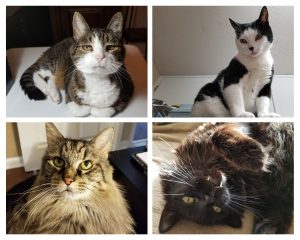
Sam works to keep her cats in the lifestyle to which they have become accustomed. Clockwise from top left: Wesley (aka “Old Man”), Simon (aka “Mr. McNaughty Pants”), Lucas (aka “Squooshy,” may he rest in peace), and Porter (aka “Floofmaster P”).
(Source: Samantha Kennedy)
After graduate school, Sam moved to Katy, Texas and lived with her brother and his family for nearly two years, until she applied for and was hired for the Family and Consumer Sciences Agent position in Manatee County. Boy, was she glad to be back in Florida! Sam has lived all over the state: north central, south, southwest, and now northwest, but there is still a lot of this beautiful state she has left to see (e.g. she has never been to the Keys, if you can believe that!).
Sam’s cats (“the boys”) are the best cats in the entire universe (though she may be a bit biased). She likes to joke she runs a retirement home for cats, since they range in age from 13 to nearly 21 years old, but she would not trade a moment of it. When she is not working to support her feline family, she enjoys reading for pleasure, taking walks, journaling, hand lettering, and napping. Sam is also a huge baseball fan (Go Rays!), and has visited over 20 major league ballparks with plans to visit all 30 before the zombie apocalypse comes.


















